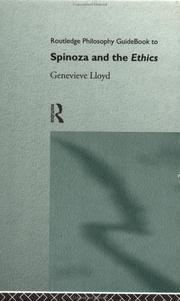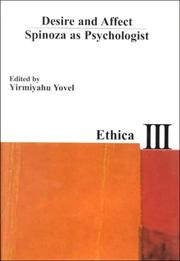| Listing 1 - 10 of 10 |
Sort by
|
Dissertation
Year: 1876 Publisher: Salzwedel : Buchdruckerei von Herm. Robolsky,
Abstract | Keywords | Export | Availability | Bookmark
 Loading...
Loading...Choose an application
- Reference Manager
- EndNote
- RefWorks (Direct export to RefWorks)
Spinoza, Benedictus de, --- Ethica (Spinoza, Benedictus de).
Book
Year: 2018 Publisher: Edinburgh : Edinburgh University Press,
Abstract | Keywords | Export | Availability | Bookmark
 Loading...
Loading...Choose an application
- Reference Manager
- EndNote
- RefWorks (Direct export to RefWorks)
Revisiting the generally accepted notion of psycho-physical parallelism in Spinoza, Chantal Jaquet offers a new analysis of the relation between body and mind. Looking at a range of Spinoza's texts, and using an original methodology, she analyses their unity in action through affects, actions and passions.
Mind and body. --- Spinoza, Benedictus de, --- Ethica (Spinoza, Benedictus de)
Book
Year: 1972 Publisher: [Paris] : Presses universitaires de France,
Abstract | Keywords | Export | Availability | Bookmark
 Loading...
Loading...Choose an application
- Reference Manager
- EndNote
- RefWorks (Direct export to RefWorks)
Ethics. --- Ethics. --- Ethiek. --- Morale. --- Spinoza, Benedictus de, --- Spinoza, Benedictus de, --- Ethica (Spinoza, Benedictus de).
Dissertation
Year: 1903 Publisher: Erlangen : E.T. Jacob,
Abstract | Keywords | Export | Availability | Bookmark
 Loading...
Loading...Choose an application
- Reference Manager
- EndNote
- RefWorks (Direct export to RefWorks)

ISBN: 9780415107822 0415107822 0415107814 9780415107815 Year: 1996 Publisher: London Routledge
Abstract | Keywords | Export | Availability | Bookmark
 Loading...
Loading...Choose an application
- Reference Manager
- EndNote
- RefWorks (Direct export to RefWorks)
"Spinoza is a key figure in modern philosophy. The Ethics is his most studied and well known work. Being both up to date and clear, this GuideBook is designed to lead the reader through this complex, seminal text." "Spinoza and the Ethics introduces and assesses Spinoza's life, and its connections with his thought; the text of the Ethics; and Spinoza's continuing relevance to contemporary philosophy."--BOOK JACKET.
Ethics. --- Spinoza, Benedictus de, --- Ethica (Spinoza, Benedictus de). --- Ethics --- 1 SPINOZA, BARUCH --- 1 SPINOZA, BARUCH Filosofie. Psychologie--SPINOZA, BARUCH --- Filosofie. Psychologie--SPINOZA, BARUCH --- Deontology --- Ethics, Primitive --- Ethology --- Moral philosophy --- Morality --- Morals --- Philosophy, Moral --- Science, Moral --- Philosophy --- Values --- Metaphysics --- Spinoza, Baruch --- Hulpwetenschappen --- Ethiek en religie. --- Spinoza, Baruch (1632-1677). Ethica --- Morale --- Ouvrages avant 1800 --- Spinoza, baruch (1632-1677) --- Spinoza, baruch (1632-1677). ethica
Book
ISBN: 9782738143495 2738143490 Year: 2018 Publisher: Paris Jacob
Abstract | Keywords | Export | Availability | Bookmark
 Loading...
Loading...Choose an application
- Reference Manager
- EndNote
- RefWorks (Direct export to RefWorks)
Les avancées de la biologie contemporaine posent de façon nouvelle des problèmes philosophiques anciens, tels que ceux des rapports entre le vivant et l'inanimé, entre le corps et l'esprit, l'erreur et la vérité. La philosophie de Spinoza, bien que datant du XVIIe siècle, apporte à ces problèmes des solutions plus pertinentes que la plupart des philosophies plus récentes, développées dans les siècles qui l'ont suivie.En retour, les acquis actuels des sciences physiques et biologiques, notamment des neurosciences cognitives, permettent de porter un nouveau regard sur certaines notions propres à la philosophie de Spinoza, telles que sa « petite physique », la nature cause de soi, la notion de matière, l'essence des choses, les genres de connaissance, qui acquièrent de ce fait un surcroît d'actualité. Une approche tout à fait nouvelle de la philosophie, et de Spinoza en particulier, grâce à la biologie et aux sciences cognitives.
Cognition. --- Biologie --- Philosophie. --- Spinoza, Baruch, --- Contribution à la biologie --- Philosophy of nature --- Spinoza, Baruch --- Biology --- Neurobiology --- Philosophy. --- Spinoza, Benedictus de, --- Influence. --- Ethica (Spinoza, Benedictus de). --- Philosophie et sciences cognitives --- Philosophie --- Neurosciences --- Knowledge --- Biology. --- Philosophy --- Contribution à la biologie. --- Biologie - Philosophie --- Neurosciences - Philosophy --- Biology - Philosophy --- Spinoza, Benedictus de, - 1632-1677

ISBN: 9780967710204 Year: 1999 Publisher: New York : Little Room Press :,
Abstract | Keywords | Export | Availability | Bookmark
 Loading...
Loading...Choose an application
- Reference Manager
- EndNote
- RefWorks (Direct export to RefWorks)
"The present book is meant to express the diversity of interpretation of Spinoza's theory and to examine critically the relevance of Spinoza's ideas to contemporary issues and debates (in philosophy, psychology, and even economics). Donald Davidson's essay, which offers a "Davidsonian" version of Spinoza's view of the affects and the mind-body relation, provides one such contemporary interpretation. The book also contains other attempts to reinterpret Spinoza in light of later problems and insights."--Jacket.
Affect (Psychologie). --- Affect (Psychology) --- Affect (Psychology). --- Emotions (Philosophy) --- Emotions (Philosophy). --- Ethica (Spinoza). --- Filosofische antropologie. --- Kongress. --- Psychologie. --- Psychology. --- Émotions (Philosophie) --- Spinoza, Benedictus ((de)). --- Spinoza, Benedictus de, --- Spinoza, Benedictus de, --- Spinoza, Benedictus de, --- Spinoza, Benedictus de, --- Spinoza, Benedictus de, --- Spinoza, Benedictus de, --- Spinoza, Benedictus de, --- Spinoza, Benedictus de, --- Contributions in psychology. --- Et la psychologie philosophique. --- Ethica (Spinoza, Benedictus de).
Book
ISSN: 1953230X ISBN: 2130378153 9782915547375 9782130378150 2915547378 Year: 1982 Publisher: Paris PUF
Abstract | Keywords | Export | Availability | Bookmark
 Loading...
Loading...Choose an application
- Reference Manager
- EndNote
- RefWorks (Direct export to RefWorks)
Political philosophy. Social philosophy --- Political sociology --- Spinoza, Baruch --- Philosophy, Modern --- Power (Philosophy) --- Ontology --- Philosophie --- Pouvoir (Morale) --- Ontologie --- Spinoza, Benedictus de, --- 1 SPINOZA, BARUCH --- Filosofie. Psychologie--SPINOZA, BARUCH --- 1 SPINOZA, BARUCH Filosofie. Psychologie--SPINOZA, BARUCH --- Political and social views. --- Power (Philosophy). --- Politieke filosofie. --- Metafysica. --- History --- Spinoza, Baruch, --- Contribution à la philosophie politique. --- Ethica (Spinoza, Benedictus de). --- 1600-1699. --- Pouvoir (philosophie) --- Contribution à la philosophie politique --- Spinoza, Benedictus de, - 1632-1677 --- Spinoza, Benedictus de --- Ispīnūzā, --- Espinoza, Baruch d', --- Sbīnūzā, --- Espinosa, Baruch de, --- de Spinoza, Benedictus --- Shpinozah, --- Shpinozah, Barukh, --- Spinoza, Benedict de, --- Spinoza, Benedict de --- Spinoza, Barukh, --- Spinoza, Baruch de, --- Spinoza, Benoît de, --- ספינאזא, ברוך דע --- ספינאזא, ברוך, --- שפימוזה, ברוך --- שפינאזא, בענעדיקט --- שפינאזא, ברוך --- שפינאזע, ברוך --- שפינוזא, בנדיקטוס --- שפינוזהת ברוך, --- שפינוזה, ברוך --- שפינוזה, ברוך די, --- שפינוזה, ברוך, --- שפינוזה, ב. --- سبينوزا، بندكتس --- Ethics. --- Philosophie politique. --- Spinoza, Benedictus de, 1632-1677
Book
ISSN: 12582743 ISBN: 2130491383 2130488900 2130473741 213048087X 2130466702 9782130466703 9782130488903 9782130473749 9782130491385 Year: 1998 Volume: 1 Publisher: Paris PUF
Abstract | Keywords | Export | Availability | Bookmark
 Loading...
Loading...Choose an application
- Reference Manager
- EndNote
- RefWorks (Direct export to RefWorks)
Ethics, Modern --- God --- Philosophy and religion --- Philosophy, Modern --- Morale moderne --- Dieu --- Philosophie et religion --- Philosophie --- History of doctrines --- History --- Histoire des doctrines --- Histoire --- Spinoza, Benedictus de, --- Spinoza, Baruch --- Spinoza, Benedictus de --- Philosophy of mind --- Soul --- Knowledge, Theory of --- Philosophie de l'esprit --- Ame --- Théorie de la connaissance --- Emotions (Philosophy) --- Emotions (Philosophie) --- Ethics --- Deontology --- Ethics, Primitive --- Ethology --- Moral philosophy --- Morality --- Morals --- Philosophy, Moral --- Science, Moral --- Philosophy --- Values --- Spinoza, Baruch, --- Éthique --- --Ethics --- Ethics. --- Affectivité. --- Spinoza, Baruch de, --- Et l'affectivité. --- Morale. --- Et la liberté. --- Et Dieu. --- Et le finalisme. --- Ethica (Spinoza, Benedictus de). --- Spinoza, Benedictus de, - 1632-1677. - Ethica --- Spinoza, Baruch, 1632-1677 --- Ispīnūzā, --- Espinoza, Baruch d', --- Sbīnūzā, --- Espinosa, Baruch de, --- de Spinoza, Benedictus --- Shpinozah, --- Shpinozah, Barukh, --- Spinoza, Benedict de, --- Spinoza, Benedict de --- Spinoza, Barukh, --- Spinoza, Benoît de, --- ספינאזא, ברוך דע --- ספינאזא, ברוך, --- שפימוזה, ברוך --- שפינאזא, בענעדיקט --- שפינאזא, ברוך --- שפינאזע, ברוך --- שפינוזא, בנדיקטוס --- שפינוזהת ברוך, --- שפינוזה, ברוך --- שפינוזה, ברוך די, --- שפינוזה, ברוך, --- שפינוזה, ב. --- سبينوزا، بندكتس --- Critique et interprétation
Book
ISBN: 1785275445 1785275453 1785275437 9781785275449 9781785275432 Year: 2020 Publisher: London : Anthem Press,
Abstract | Keywords | Export | Availability | Bookmark
 Loading...
Loading...Choose an application
- Reference Manager
- EndNote
- RefWorks (Direct export to RefWorks)
Peter Guy Winch (1926-1997) was one of the most important philosophers of the second half of the twentieth century. He is best known for his early work on the philosophy of the social sciences, in particular his monograph The Idea of a Social Science and its Relation to Philosophy (1958), which generated controversy within both philosophical and social scientific circles.
This volume unites Peter Winch's previously unpublished work on Baruch de Spinoza. The primary source for the text is a series of seminars on Spinoza that Winch gave, first at the University of Swansea in 1982 and then at King's College London in 1989. Audio recordings of the majority of the Swansea seminars have survived. The editors have transcribed these, edited them for coherence, style and clarity, and supplemented them with material drawn from Winch's typescripts and preparatory notebooks. What emerges is an original interpretation of Spinoza's work that demonstrates his continued relevance to contemporary issues in metaphysics, epistemology and ethics, and establishes connections to other philosophers - not only Spinoza's predecessors such as Descartes, but also to the philosophical views of Ludwig Wittgenstein and Simone Weil.
There is currently a resurgence of interest in Spinoza's philosophy, and this volume will contribute to burgeoning debates within that field. Winch's account of Spinoza is uncommon insofar as it takes as central to Spinoza's project his conceptions of meaning, understanding and language, and directly connecting these to his ethical concerns. At the same time, Winch makes useful links to modern debates in ways that throw helpful light on Spinoza. As well as issues which are central to the philosophy of language, these include debates on the nature of the mind, naturalism and the place of the human being within the natural world.
Spinoza, Benedictus de, --- Metaphysics. --- Knowledge, Theory of. --- Ethics. --- Deontology --- Ethics, Primitive --- Ethology --- Moral philosophy --- Morality --- Morals --- Philosophy, Moral --- Science, Moral --- Philosophy --- Values --- Epistemology --- Theory of knowledge --- Psychology --- God --- Ontology --- Philosophy of mind --- Ispīnūzā, --- Spinoza, Baruch, --- Espinoza, Baruch d', --- Sbīnūzā, --- Espinosa, Baruch de, --- de Spinoza, Benedictus --- Shpinozah, --- Shpinozah, Barukh, --- Spinoza, Benedict de, --- Spinoza, Barukh, --- Spinoza, Baruch de, --- Spinoza, Benoît de, --- ספינאזא, ברוך דע --- ספינאזא, ברוך, --- שפימוזה, ברוך --- שפינאזא, בענעדיקט --- שפינאזא, ברוך --- שפינאזע, ברוך --- שפינוזא, בנדיקטוס --- שפינוזהת ברוך, --- שפינוזה, ברוך --- שפינוזה, ברוך די, --- שפינוזה, ברוך, --- שפינוזה, ב. --- سبينوزا، بندكتس --- Spinoza, Benedictus de --- Spinoza, Baruch --- Spinoza, Benedict de --- Ethica (Spinoza, Benedictus de) --- Ethik des Spinoza im Urtexte (Spinoza, Benedictus de) --- Metaphysics --- Knowledge, Theory of --- Ethics
| Listing 1 - 10 of 10 |
Sort by
|

 Search
Search Feedback
Feedback About UniCat
About UniCat  Help
Help News
News